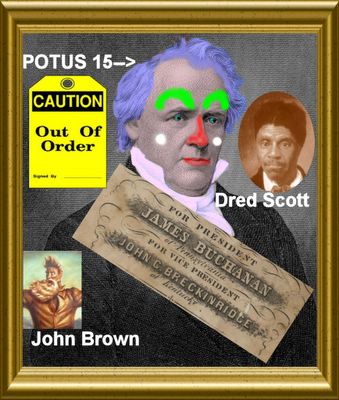
click to enlarge
James Buchanan rose from the state legislature to representative, senator and cabinet member. He made a run at the White House in 1844, 1848, and 1852 before finally winning in 1856.
In the 1850s, the question of slavery divided the United States. People hoped that the new President, "Old Buck," was the man to prevent a national crisis. He failed miserably. During his administration, the Union broke apart, and when he left office, civil war was just around the corner.
By 1856, the debates over slavery had reached hysterical intensity, with abolitionists and proslavery forces alike advocating violence and resorting to it frequently.
Two days after Buchanan's inauguration, the Supreme Court announced the Dred Scott decision. Influenced by the new President's pro-southern interests, the Court ruled that because slaves (and former slaves) were not citizens, they had no right to sue for freedom. The court also invalidated the Missouri Compromise of 1820, which banned slavery in the portion of the Louisiana Purchase above 36 degrees latitude. Republicans denounced the decision and vowed to repudiate it.
America was a hopelessly divided nation. The Republicans were anti-slavery Northerners, and the Democrats, mostly Southerners with Northern allies who defended states' rights.
In 1859, John Brown seized the Southern town of Harpers Ferry in Virginia in an attempt to spark an uprising of slaves. Brown was captured and hanged but his action only fanned the flames.
The Democratic Party finally snapped in two. An unknown lawyer from the insurgent Republican Party--Abraham Lincoln--won the White House. The election of a Northerner opposed to the extension of slavery outside existing Southern states was the straw that broke the camel's back.
Six weeks after Abraham Lincoln's election, South Carolina left the Union, and six other states soon followed. Lame Duck Buchanan did nothing to stop the secessions, which strengthened the young Confederacy and gave seceding states time to set up a government. Buchanan was eager to depart the White House before the real disaster. On leaving office, he saw only close friends until his death in 1868.
---o0o---
1 comment:
A couple of items about John Brown:
How John Brown's Body turned into the Battle Hymn of the Republic and the same story by Sarah Vowell on This American Life (very funny). Sarah's story is in "Act II about 20 minutes in (I think).
Post a Comment